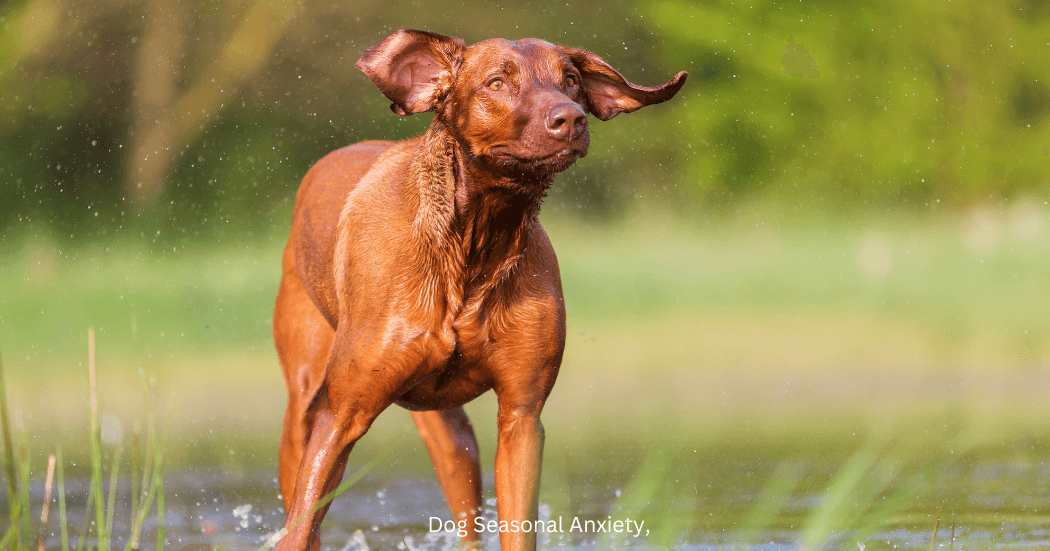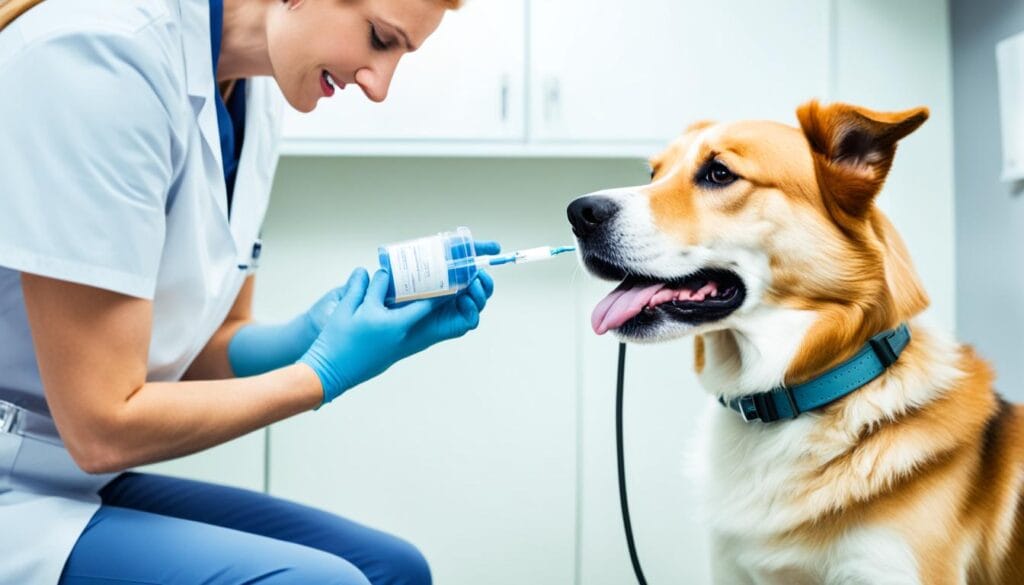Does your dog shake its head often? While this can be normal, if it happens a lot, it might show they’re not feeling well. Causes can include ear infections, allergies, or having water in their ears. If these issues are not tackled quickly, they could get worse. For dogs, ear infections are a common reason for a lot of head shaking. They can be quite painful and may even cause hearing loss or damage to blood vessels in the ears. It’s really important to find out why your dog is shaking its head and get the right treatment. This will keep them healthy and happy.
Key Takeaways
- Why Your Dog Keeps Shaking Head: Causes & Solutions.
- Persistent head shaking might indicate underlying health issues like ear infections or allergies.
- Ear infections can cause redness, swelling, and discharge from the ears, often accompanied by a foul smell.
- Allergies, both environmental and food-related, can lead to head shaking and require veterinary consultation for proper diagnosis and treatment.
- Foreign objects in the ears, such as dirt or plant debris, are more common in dogs with bat or prick ear shapes.
- Immediate veterinary attention is crucial to prevent severe complications and ensure the well-being of your dog.
Common Causes of Head Shaking in Dogs
When dogs shake their heads, it could mean several things. Knowing these reasons is key for pet owners. It helps them make sure their dogs’ ears are healthy and they’re well overall.
Ear Infections
Ear infections are often behind a dog’s excessive head shaking. These infections, caused by bacteria or yeast, make the ears inflamed and produce discharge. This discomfort leads to dogs shaking their heads a lot. It’s crucial to act swiftly with dog ear infection treatment when you suspect this.
Allergies
Allergies, both from the environment and food, can also make dogs shake their heads. They might show other signs like itching, hair loss, and ear infections. To manage this, figuring out the allergens through tests is important. It helps with treating the issue and keeping dog ear health in check.
Water in the Ears
After a swim or bath, water stuck in the ears can cause discomfort. Dogs might shake their heads to get it out. To avoid this, using cotton balls in their ears during baths is a good idea. So is cleaning their ears regularly after they get wet. This helps prevent infections and keeps your dog’s ears healthy.
| Cause | Symptoms | Preventive Measures |
|---|---|---|
| Ear Infections | Itchiness, Discharge, Inflammation | Regular ear cleaning, timely veterinarian consultations |
| Allergies | Itchy Skin, Hair Loss, Ear Infections | Avoidance of known allergens, usage of hypoallergenic diets |
| Water in the Ears | Discomfort, Head Shaking | Use of cotton balls during baths, post-swimming ear cleaning |
How to Identify Ear Infections in Dogs
Ear infections in dogs are quite common and can cause a lot of trouble. Catching the signs early helps your dog’s ears stay healthy. It also stops other problems from happeninglater on.
Symptoms to Look For
If your dog keeps shaking its head, pay attention. Signs of a problem can include:
- Redness
- Swelling
- Discharge
- Persistent scratching
- Frequent head shaking
Dogs get itchy ears from infections, making them shake their heads a lot. They might also have repeated infections and lose some hair. This could point to allergies being the root cause.
Diagnosis by Your Veterinarian
A vet checks a dog’s ears by looking deep inside with a special tool. This helps find if there’s any dirt, water, or infection.
They then might need to take swabs and look at them under a microscope. This helps to see if it’s bacteria or a fungus causing the issue. For ongoing problems, they may do tests to check for allergies.
| Common Causes | Symptoms | More Information |
|---|---|---|
| Ear Infections | Redness, discharge, head shaking | Most frequent cause of head shaking |
| Ear Mites | Itching, debris in ear canal | Less common in adult dogs |
| Allergies | Skin irritation, hair loss, frequent infections | Can be diagnosed via skin or blood tests |
| Neurological Disorders | Head tremors, difficulty walking | Accompanied by other symptoms |
If your dog’s ear troubles last more than a day or get worse, see a vet. Treating ear infections early really helps, and it prevents bigger issues. Without prompt treatment, your dog might face ongoing ear problems. Severe cases can even need surgery.
Treating and Preventing Ear Infections
To treat ear infections in dogs, vets use both medicines and natural methods. Ear infections are common and can cause dogs to shake their heads a lot. It’s important to tackle this issue fast and well.
Medication Options
Vets often suggest antibiotics or antifungal drugs for ear infections. They pick these based on if the infection is from bacteria or yeast. These medicines are key to stopping the infection and easing symptoms. It’s critical to use them exactly as the vet tells you.
Home Remedies
Natural ways to keep dog ears healthy are also crucial. Using special ear cleaners helps keep ears clean. After baths or swims, make sure your dog’s ears are dry. This helps avoid water-related ear infections and head shaking. A good diet is also essential. It can improve health and lower risks of ear problems caused by allergies.
Mixing vet medicines with natural care is an excellent way to prevent ear infections. This approach can greatly reduce head shaking in dogs.
Dog Keeps Shaking Head: Understanding Allergies
Dogs often shake their heads due to allergies. This can come with sneezing, itchy skin, and tummy troubles. It’s key to handle dog allergies treatment early to stop ongoing issues.
Environmental Allergies
Things like pollen, dust mites, and mold can make dogs itchy. They might get ear infections and shake their heads a lot. Treating environmental allergies may need special shampoos, antihistamines, and keeping away from irritants. Regularly cleaning the dog’s area also helps.
Food Allergies
Some dogs are allergic to certain foods. This might be proteins like beef or grains. Finding these and removing them from your dog’s meals is crucial. Using allergen-free diets for dogs can make symptoms go away. But, it’s important to work with a vet to make sure your dog still gets the right nutrition.
There’s a lot to know about treating dog allergies. Check out our table for a detailed breakdown on managing these allergies.
| Allergy Type | Common Symptoms | Recommended Treatments |
|---|---|---|
| Environmental Allergies | Itchy skin, sneezing, ear infections | Antihistamines, medicated shampoos, allergen avoidance |
| Food Allergies | Digestive issues, skin irritations, head shaking | Elimination diets, allergen-free diets for dogs, hypoallergic foods |
Water Prevention Tips for Dog’s Ears
To keep your dog’s ears healthy, focus on dog ear care during bathing. A great way to stop water irritating your dog’s ears is to use cotton balls. These are a good dog swimming ear protection.
It’s important to dry your dog’s ears well after they swim or bathe. Use a solution your vet recommends to clean their ears. This keeps them healthy and helps prevent ear infections.
Following these steps for dog swimming ear protection makes bath time fun and keeps your dog from shaking its head. Make checking and cleaning your dog’s ears a regular part of their care. This keeps them happy and healthy.
Serious Conditions Related to Head Shaking
Head shaking in dogs could be a sign of something serious. It often means they have something stuck in their ear. Dogs that play outside can get dirt or debris in their ears. This irritates them, leading to shaking.
Hypothyroidism is another issue that can cause this. It leads to recurring ear infections. Also, some dogs are born with ear problems. So, getting a veterinary check-up for head shaking is needed to find the real cause.
Certain brain problems can cause head tremors. This is true for cerebellar hypoplasia. It usually affects Airedales and Boston Terriers. Some young dogs also shake their heads for no clear reason. This often happens in breeds like Dobermans and Boxers, when they’re under three years old.
Other sicknesses can also make dogs shake their heads. Pemphigus, for example, makes them scratch a lot. It’s important to see a vet for a check-up if your dog keeps shaking its head. This way, the real cause can be found.
Knowing about these problems can help pet owners early on. Early treatment can prevent serious health issues. If your dog keeps shaking its head, visiting a vet is vital. This can save your dog from a lot of pain and discomfort.
Foreign Objects in the Ear Canal
When dogs are outside a lot, things like dirt, bugs, and seeds can get stuck in their ears. This can be very uncomfortable for them. You might notice your dog shaking its head a lot when this happens. This is a sign to check their ears carefully.
Seeing a vet is key if your dog has something stuck in its ear. A special exam called otoscopy is used to find and see the object. In some cases, the dog might need to be put to sleep slightly to remove it safely. Also, the vet might check for ear infections caused by these objects.
Handling this problem quickly is important. It can prevent worse issues like aural hematomas. Owners should keep their pets away from places where they might pick up these items. Fast vet care can stop the pain and fix the problem.
Preventing this from happening is best. Clean your dog’s ears with safe products regularly. But, be gentle to not hurt their ears. If your dog’s ears still bother them, a vet visit is a must to keep their ears healthy.
Inflammatory Diseases Causing Head Shaking
Dogs can shake their heads because of a few different health problems, like inflammatory diseases. It’s really important to find out what’s wrong with them. This way, they can get the right treatment and start feeling better.
Common Inflammatory Conditions
Some common issues are autoimmune diseases and allergies. These can show up as sores, ulcers, and red parts on the skin. Allergies can make a dog itchy, lose hair, and get ear infections. This makes them shake their heads a lot.
Diagnosis and Treatment
Finding the real cause of a dog shaking its head means looking at many possibilities. This might include a detailed check-up and looking at a small piece of the problem area under a microscope. Then, when the issue is clear, treatments like medicine or diet changes can help a lot. It’s best to find out early what’s wrong. This helps stop the problem from getting worse and lets the dog live a happier life.
Neurological Disorders and Head Shaking
Neurological disorders can make dogs shake their heads involuntarily. It’s important to understand these movements. This helps figure out what to do next.
Identifying Head Tremors vs. Head Shaking
Head shaking is usually because of ear infections or allergies. But head tremors are not under the dog’s control. These are signs something is wrong with the dog’s nerves.
Symptoms might include walking trouble, falling, or having seizures. Knowing these signs helps the vet make the right diagnosis.
Some diseases cause dogs to shake their heads or limbs. For example, canine distemper virus is serious and can affect the breathing, digestion, and nerves. It may cause a dog’s limbs or head to jerk rhythmically.
Cerebellar hypoplasia is like cerebral palsy in humans. It’s when the cerebellum doesn’t fully develop. This leads to head bobbing, tremors, and trouble balancing.
Treatment Options
For canine neurological disorders, seeing a vet who specializes in nerves is best. Tests may include video to catch the tremors and more nerve checks. Causes vary from harmless head tremors to cerebellar hypoplasia in certain dog breeds.
Treatments depend on what the diagnosis is. It might be supportive care, managing symptoms with drugs, or focused on the specific nerve issue. For example, dogs with ear infections might need personalized care.
Getting help early from a pro can make a big difference in your dog’s health. Correct medical help is key in understanding and treating neurological issues.
When to Seek Veterinary Help
Does your dog shake their head a lot? It could signal a health problem. It’s important to spot signs early and take action. Doing so is key to your pet’s health and happiness.
Signs that Indicate a Vet Visit is Needed
- Continuous and vigorous head shaking lasting more than a day
- Accompanying symptoms such as redness, swelling, discharge, or a foul smell from the ears
- Visible discomfort, pawing at the ears, or excessive scratching
- Behavioral changes such as irritability or lethargy
If your dog shakes their head a lot, watch out for these signs. They may have an ear infection, allergies, or even something stuck in their ear. Quick detection and treatment is important to avoid worse problems.
What to Expect During the Visit
When you visit the vet about head shaking, they’ll do a full ear check. Here’s what they might do:
- Otoscope examination to check for foreign objects, debris, or signs of infection
- Swabbing the ear for samples to be tested for bacterial or yeast infections under a microscope
- Assessing for any visible inflammation, discharge, or structural abnormalities in the ear canal
- Possible sedation to clean the ears thoroughly, if necessary
Getting timely and right care for your dog’s head shaking can make them feel better. It also stops more issues, making your furry friend’s life better.
Conclusion
Addressing the root cause of head shaking in dogs quickly is key. This helps prevent long-term health problems. Dogs might shake their heads a lot because of ear infections, allergies, or even tumors.
Keeping your dog’s ears clean and healthy is important. It helps your dog feel better. If you see your dog shaking its head a lot, it’s best to see a vet. They can recommend the right solutions.
It’s important to care for your dog’s ears well. This means cleaning them and checking for any issues often. Doing this can make your dog’s life better. And it gives you peace of mind. Always listen to what the professionals say for treating dog head shaking.






















